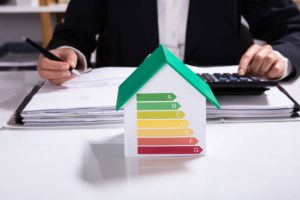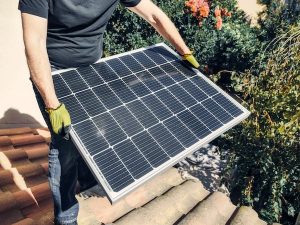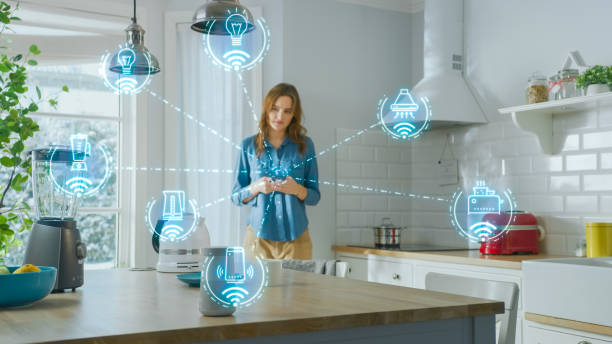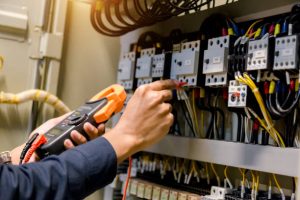Energy-efficient electrical upgrades can significantly reduce energy consumption and save money on monthly bills. Not only do these upgrades benefit your wallet, but they also help to reduce your carbon footprint and protect the environment. This blog post will share 10 tips for implementing energy-efficient electrical upgrades in Auckland for Residential or Commercials.
Conduct an energy audit.
The first step in implementing energy-efficient upgrades is understanding where you can improve. An energy audit is a comprehensive assessment of your home or business’s energy usage. A professional energy auditor will assess your property, identifying areas where energy is wasted and providing recommendations for improvement. Some common areas to focus on during an energy audit include sealing air leaks, improving insulation, and upgrading energy-efficient appliances and lighting.

Install solar panels.
Solar panels are a popular and effective way to reduce energy consumption and save money on electricity bills. Solar panels work by converting sunlight into electricity, which can be used to power your home or business. The initial cost of installing solar panels may be high, but the long-term savings can be significant. Many local and national governments also offer incentives and rebates for solar panel installations, making them a cost-effective investment.

Upgrade your heating, and cooling system
Heating and cooling systems are some of the biggest energy consumers in a home or business. Upgrading to a more energy-efficient model can significantly reduce your energy consumption and save you money on your monthly bills. Some energy-efficient options to consider include programmable thermostats, which allow you to control the temperature in your property better, and high-efficiency furnaces and air conditioners.
Replace old windows and doors.
Old windows and doors can be a significant source of energy loss in a home or business. Replacing them with energy-efficient models can help to reduce drafts and improve the insulation of your property, leading to lower energy bills. Energy-efficient windows and doors are designed to keep heat in during the winter and out during the summer, making them a cost-effective upgrade year-round.

Invest in energy-efficient appliances, and electronics
Appliances and electronics are other significant sources of energy consumption in a home or business. Upgrading to energy-efficient models can significantly reduce your energy usage and save you money on your monthly bills. Look for products with Energy Star ratings, which indicate that they are more energy-efficient than standard models. Some energy-efficient appliances and electronics to consider include refrigerators, washing machines, and computer monitors.
Utilize energy-efficient lighting solutions
Lighting is another area where energy efficiency can be improved. Traditional incandescent bulbs are highly inefficient, using significantly more energy than energy-efficient alternatives such as LED bulbs and fixtures. LED Lighting uses up to 80% less energy than incandescent bulbs and can last for many years, making them a cost-effective lighting solution.
Consider installing an intelligent home system.
A smart home system can help you better monitor and control your energy usage. An innovative home system can remotely control and schedule your appliances and electronics and monitor your energy consumption in real-time. This can help you identify areas of energy waste and adjust to reduce your energy consumption.

Take advantage of government incentives and rebates.
Many local and national governments offer financial incentives to encourage homeowners and businesses to invest in energy-efficient technologies. These incentives and rebates can significantly reduce the upfront cost of energy-efficient upgrades, making them a more cost-effective investment.
Consider hiring a professional
Upgrading to energy-efficient systems can be complex, and it’s crucial to ensure that the work is done correctly. Consider hiring professional electricians to help with your energy-efficient upgrades. A professional can provide valuable guidance and expertise, ensuring that your upgrades are done correctly and efficiently.
Remember to maintain and service your systems.
To ensure that your energy-efficient systems are running at their best, it’s important to maintain and service them regularly. This can include cleaning filters, checking leaks, and testing for proper operation. By regularly maintaining and servicing your energy-efficient systems, you can ensure that they run efficiently and provide maximum benefits.

Savings per month after Energy Efficient Electrical Upgrade
Here is an example of a comparison table that shows how much you can save per month with energy-efficient electrical upgrades:
| Upgrade | Cost per Month with Old System | Cost per Month with Energy-Efficient Upgrade | Monthly Savings |
| Solar panels | $150 | $100 | $50 |
| Heating and cooling system | $100 | $75 | $25 |
| Windows and doors | $30 | $25 | $5 |
| Appliances and electronics | $20 | $15 | $5 |
| Lighting | $10 | $8 | $2 |
| Smart home system | $10 | $8 | $2 |
It’s important to note that the costs and savings listed in the previous table are just estimates and will vary depending on your specific situation. To get a more accurate idea of the costs and savings associated with energy-efficient upgrades, it’s essential to consider the following factors:
- The size and energy consumption of your home or business: The more extensive your property and the higher your energy consumption, the more you stand to save with energy-efficient upgrades.
- The cost of energy in your area: Energy prices can vary significantly depending on where you live. If energy is relatively expensive in your area, you may see more significant savings from energy-efficient upgrades.
- The specific upgrades you choose: The costs and savings associated with different upgrades will vary. For example, solar panels may have a higher upfront cost. Still, they can lead to significant long-term savings, while upgrading to energy-efficient appliances may have a lower upfront cost but smaller ongoing savings.
To get a more accurate estimate of the costs and savings associated with energy-efficient upgrades, consulting with a professional or conducting research is a good idea. You can also use online tools and resources like energy-saving calculators to better understand potential costs and savings.
Conclusion:
Energy-efficient electrical upgrades can significantly reduce energy consumption and save money on monthly bills. Following these 10 tips, you can make your home or business more energy-efficient and contribute to a more sustainable future. The benefits of implementing energy-efficient upgrades far outweigh the initial cost, making them a wise investment for any homeowner or a business owner.
FAQs
How do energy-efficient upgrades save me money?
Energy-efficient upgrades can save you money in a few ways. First, you will use less and pay less on your monthly bills by reducing your energy consumption. Second, many energy-efficient upgrades have a longer lifespan than standard products so you will save money on replacement costs in the long run. Finally, many local and national governments offer financial incentives and rebates for energy-efficient upgrades, which can significantly reduce the upfront cost.
What are some standard energy-efficient electrical upgrades?
Some standard energy-efficient upgrades include installing solar panels, upgrading to energy-efficient appliances and lighting, sealing air leaks, improving insulation, and replacing old windows and doors with energy-efficient models. Installing a smart home system and utilizing energy-efficient lighting solutions, such as LED bulbs, can also help to reduce energy consumption.
Are energy-efficient electrical upgrades expensive?
The upfront cost of energy-efficient upgrades can vary, but many homeowners and businesses find that the long-term savings are well worth the investment. Additionally, many local and national governments offer financial incentives and rebates for energy-efficient upgrades, which can significantly reduce the upfront cost.
How do I know if an upgrade is energy-efficient?
One way to determine if an upgrade is energy-efficient is to look for products with Energy Star ratings. Energy Star is a program run by the U.S. Environmental Protection Agency that certifies energy-efficient products. Products with Energy Star ratings have been tested and certified to be more energy-efficient than standard models. You can also ask a professional for recommendations or research energy-efficient products online.

 info@strike.net.nz
info@strike.net.nz

